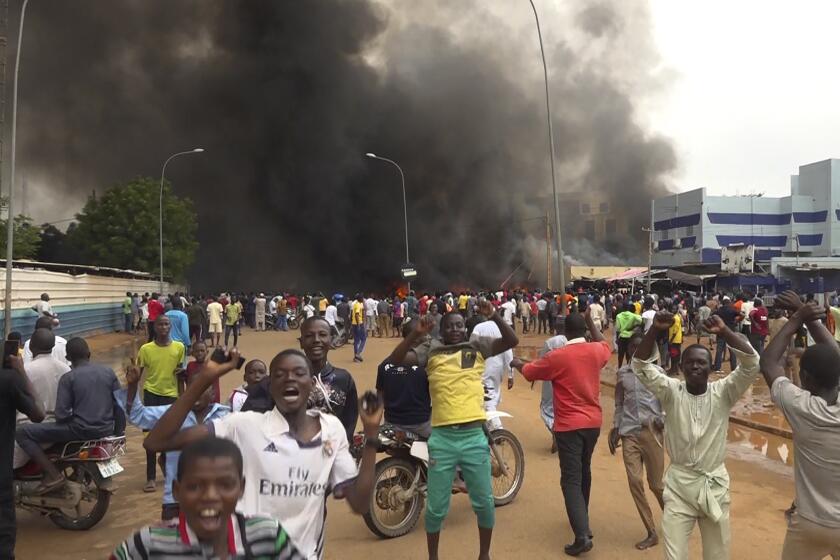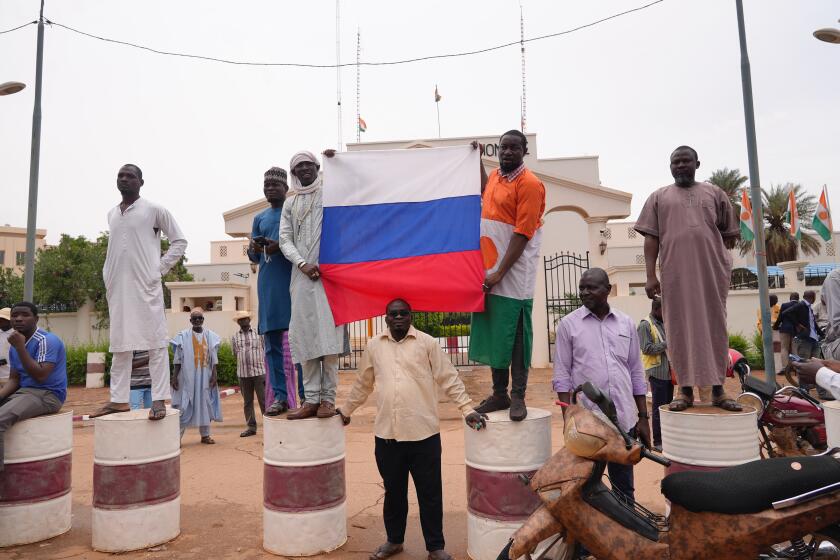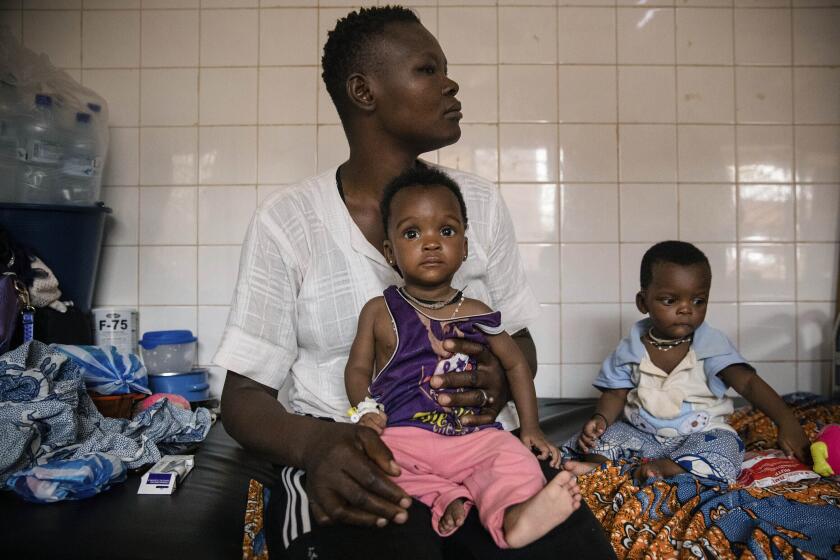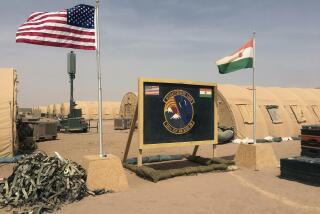West African nations prepare to send troops to restore democracy in Niger
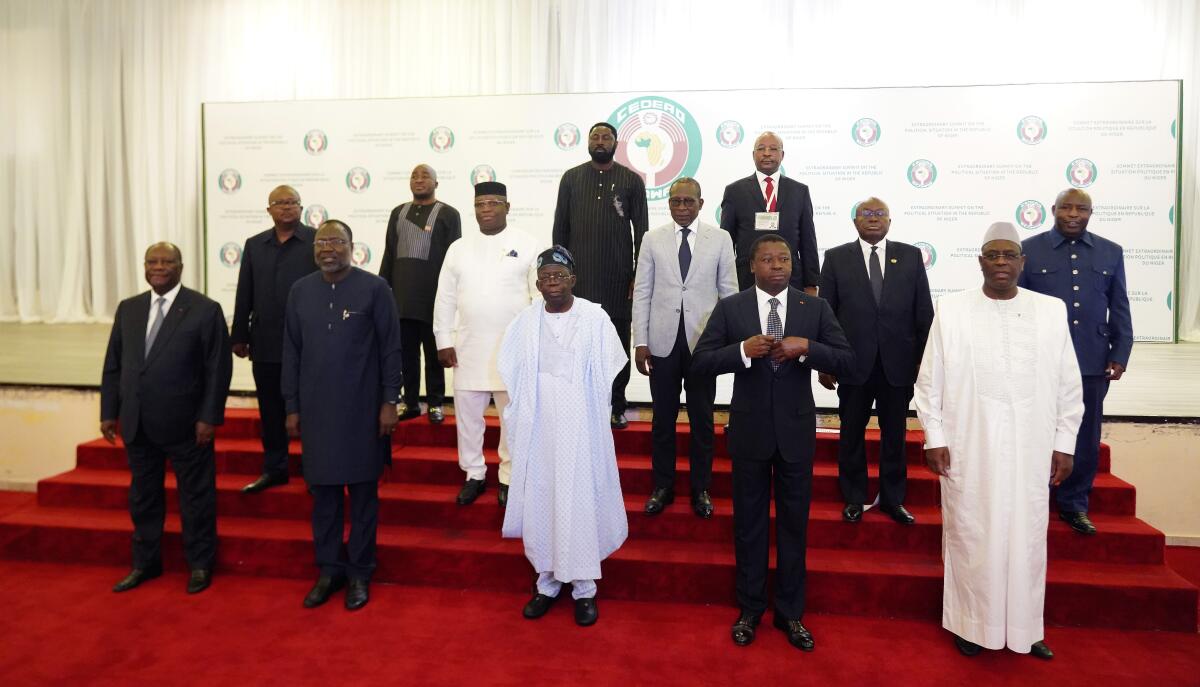
- Share via
NIAMEY, Niger — Tensions are escalating between Niger’s new military regime and the West African regional bloc that has ordered the deployment of troops to restore the country’s flailing democracy.
The ECOWAS organization said Thursday that it had directed a “standby force” to restore constitutional order in Niger after its Sunday deadline to reinstate ousted President Mohamed Bazoum expired.
Hours earlier, two Western officials told the Associated Press that Niger’s new ruling junta had told a top U.S. diplomat that it would kill Bazoum if neighboring countries attempted any military intervention to restore him to power.
It’s unclear when or where the regional force will deploy and which countries of the 15-member bloc would contribute to it. Conflict experts say it would likely comprise some 5,000 troops led by Nigeria and could be ready within weeks.
After the ECOWAS meeting, the president of neighboring Ivory Coast, Alassane Ouattara, said his country would take part in the military operation, along with Nigeria and Benin.
“Ivory Coast will provide a battalion and has made all the financial arrangements. ... We are determined to install Bazoum in his position. Our objective is peace and stability in the sub-region,” Ouattara said on state television.
Niger is the West’s last, best ally in Africa’s Sahel. A coup there may be a victory for Russia.
Niger, an impoverished country of some 25 million people, was seen as one of the last local partners for Western nations to enlist in beating back a jihadi insurgency, linked to Al Qaeda and Islamic State, that has ravaged the region. France and the U.S. have more than 2,500 military personnel in Niger and together with other European partners had poured hundreds of millions of dollars into propping up its military.
The junta responsible for spearheading the coup, led by Gen. Abdourahmane Tchiani, has exploited anti-French sentiment among the population to shore up its support.
Nigeriens in the capital, Niamey, said Friday that ECOWAS was out of touch with the reality on the ground and shouldn’t intervene.
“It is our business, not theirs. They don’t even know the reason why the coup happened in Niger,” resident Achirou Harouna Albassi said. Bazoum was not abiding by the will of the people, he said.
Niger’s president defiantly declared that democracy would prevail, a day after mutinous soldiers detained him.
On Friday the African Union expressed strong support for ECOWAS’ decision and called on the junta to “urgently halt the escalation with the regional organization.” It also called for Bazoum’s immediate release. An African Union meeting expected for Saturday to discuss the situation in Niger was postponed.
On Thursday night, after the ECOWAS summit, France’s Foreign Ministry said it supported “all conclusions adopted.” U.S Secretary of State Antony J. Blinken said Washington appreciated “the determination of ECOWAS to explore all options for the peaceful resolution of the crisis” and would hold the junta accountable for Bazoum’s safety and security. However, Blinken did not specify whether the U.S. supported the deployment of troops.
The mutinous soldiers who ousted Bazoum more than two weeks ago have entrenched themselves in power, appear closed to dialogue and have refused to release the president. Representatives of the junta told U.S. Undersecretary of State Victoria Nuland of the threat to Bazoum’s life during her visit to the country this week, a Western military official said, speaking on condition of anonymity because of the sensitivity of the situation.
A U.S. official, also speaking on condition of anonymity, confirmed that account.
The United Nations food agency says millions of hungry people in West Africa are left without aid because it is struggling with limited funding.
“The threat to kill Bazoum is grim,” said Alexander Thurston, assistant professor of political science at the University of Cincinnati. There have been unwritten rules until now about how overthrown presidents are treated and violence against Bazoum would evoke some of the worst coups of the past, he said.
Human Rights Watch said Friday that it had spoken to Bazoum, who said that his 20-year-old son was sick with a serious heart condition and has been refused access to a doctor. The president said he hasn’t had electricity for nearly 10 days and isn’t allowed to see family or friends or to bring supplies into the house.
It’s unclear if the threat on Bazoum’s life would change ECOWAS’ decision to intervene militarily. It might give them pause or push the parties closer to dialogue, but the situation has entered uncharted territory, analysts say.
“An ECOWAS invasion to restore constitutional order into a country of Niger’s size and population would be unprecedented,” said Nate Allen, an associate professor at the Africa Center for Strategic Studies. Niger has a fairly large and well-trained army that, if it actively resisted an invasion, could pose significant problems for ECOWAS. This would be a very large and significant undertaking, Allen said.
Breaking News
Get breaking news, investigations, analysis and more signature journalism from the Los Angeles Times in your inbox.
You may occasionally receive promotional content from the Los Angeles Times.
While the region oscillates between mediation and preparing for war, Nigeriens are suffering the effects of harsh economic and travel sanctions imposed by ECOWAS.
Before the coup, more than 4 million Nigeriens were reliant on humanitarian assistance. The situation could become more dire, said Louise Aubin, the United Nations Resident Coordinator in Niger.
Aid groups are battling restrictions on multiple fronts.
ECOWAS sanctions have banned the movement of goods between member countries, making it hard to bring in materials. The World Food Program has some 30 trucks stuck at the Benin border unable to cross. Aid organizations are also trying to navigate restrictions within the country as the junta has closed Niger’s airspace, making it hard to get clearance to fly the humanitarian planes that transport goods and personnel to hard-hit areas.
Flights are cleared on a case-by-case basis, and there is irregular access to fuel, which disrupts aid operations, Aubin said.
More to Read
Sign up for Essential California
The most important California stories and recommendations in your inbox every morning.
You may occasionally receive promotional content from the Los Angeles Times.
